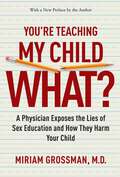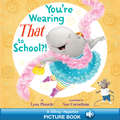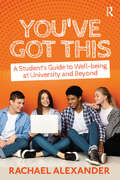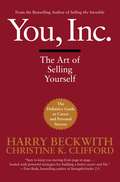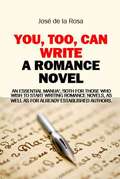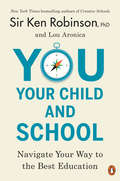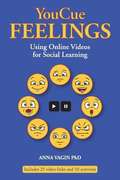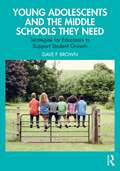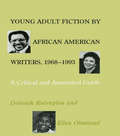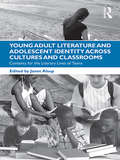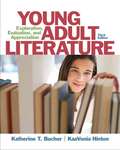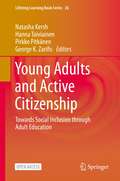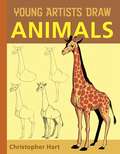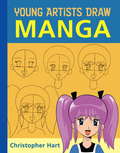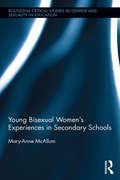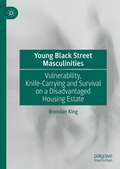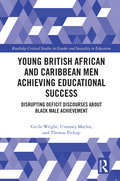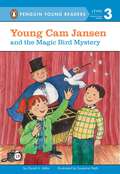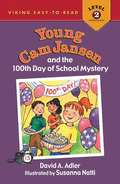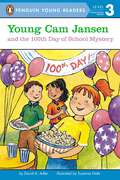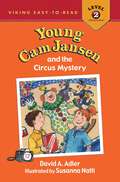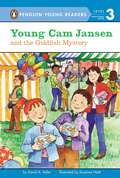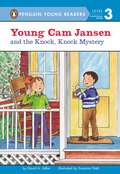- Table View
- List View
You're Teaching My Child What?: A Physician Exposes the Lies of Sex Education and How They Harm Your Child
by Miriam GrossmanIf you think sex education is still about the birds and the bees, think again. And it's not about science either. In her shocking exposé, You're Teaching My Child What?, Dr. Miriam Grossman rips back the curtain on sex education today, exposing a sordid truth. Today's sex ed programs aren't based on science; they're based on liberal lies and politically correct propaganda that promote the illusion that children (yes, children) can be sexually free without risk. As a psychiatrist and expert on sexual education, Dr. Grossman cites example after example of schools and organizations whitewashing—or omitting altogether— crucial information that doesn't fit in with their "PC" agenda. Instead, sex educators only tell teens the "facts of life" that promote acceptance, sexual exploration, and experimentation. What sex educators call an education, scientists would call a scam: • Sex educators won't tell girls their bodies are biologically and chemically more susceptible to STDs; they will only say 3 million girls have a sexually transmitted infection • Educators say it's natural for children to "explore" their sexuality from a young age and only they can decide when it's right to have sex—the real truth is neurobiologists say teen brains are not developed to fully reason and weigh consequences, especially in "the heat of the moment" • Teens are told condoms, vaccines and yearly testing provide adequate protection, without being told that studies now show condoms are no match for herpes, HPV and gonorrhea In You're Teaching My Child What?, Dr. Grossman reveals biological truths that you won't find in today's classrooms. You're Teaching My Child What? is critical reading for parents with teens and instrumental in teaching children the truth about sex.
You're Wearing THAT to School?!: A Read-Along Book (Hyperion Picture Book (ebook) Ser.)
by Lynn PlourdeRead along with Hyperion! "Oh, yes, yes!" Penelope is so excited about the first day of school that she's doing her happy hippo dance. She can't wait to wear her rainbow sparkle outfit, bring her favorite stuffed toy for show-and-tell, and share a big picnic lunch with all her new friends. "Oh, no, no!" says her best pal Tiny, who started school last year. He has a few tips for Penelope about fitting in without sticking out. Follow along with word-for-word narration as the friends' very different ways of handling peer opinion create hilarious scenes that will erase any anxiety before the first day of school.
You're on the Trail! (Reach Into Phonics Ser.)
by Deborah J. Short Deanne W. Kells Donovan BrockNIMAC-sourced textbook
You've Got This: A Student’s Guide to Well-being at University and Beyond
by Rachael AlexanderYou can take control of your well-being and mental health.Student life can be overwhelming, with so many issues to deal with including living away from home, workload, deadlines and exams, family pressures and challenging relationships. It is not surprising that you might struggle to cope sometimes. But there are simple and effective ways that you can take ownership of your mental health, meaning you stay stress free, enjoy your university experience and achieve academic success.This book guides you through your student journey from preparing to go to college or university, managing the academic pressures, finding a job, and everything in-between. Relevant scenarios are presented, linked to a series of topics that explore the challenges you might experience, along with self-enquiry reflections which help you to apply the theory to your own experience and key take-aways. The approaches and strategies outlined will help you improve your academic performance, enhance your social skills, learn to manage your emotions, reduce your anxieties, and help you to think in more empowering ways.Combining practical psychological and spiritual guidance, You’ve Got This is written in a down to earth, jargon-free way, helping you, the reader take responsibility over the most important thing of all – the way you think.Examples of topics covered: I am homesick and feel lonely I feel like I don’t fit in I feel anxious about attending lectures I am scared to admit I am struggling at university I feel anxious about submitting my work I am worried if I don’t get good grades, I won’t get a good job I don’t like attending lectures Why do I struggle with my mental health? I think I may have an eating disorder With over 100 topics providing solutions to common challenges faced by the university student, this book is a preventative tool, helping the student stay emotionally balanced allowing academic success....This book provides the kind of advice academic staff would want to offer if they could and gives boundless reassurance to parents who might be ‘too’ close to be able to help at the time. Perhaps most importantly, it offers students an immediate sense of not being alone, not being the only person to experience such fears, anxieties and stresses and instils the capacity to deal with the in ways that will, hopefully, provide them with learning for life.Professor Jonathan Parker, Bournemouth University
You've Gotta Have Heart in Your Writing (4th Edition)
by James L. BrimeyerThis book, a combination writing guide and handbook written for both English Composition I and II, offers students strategies that will serve them in developing the types of written communication and thought essential to academic, working world, and personal success. The book focuses on writing as process and is intended to help students identify and refine their own personal writing processes. The chapters are divided into three parts: a composition section based on writing projects, a stylistic section for writing improvement, and a portfolio section to support ongoing learning.
You, Inc.: The Art of Selling Yourself
by Harry Beckwith Christine Clifford BeckwithHarry Beckwith, the bestselling author of the classic "Selling the Invisible," reveals how the secret to selling is to sell oneself first.
You, Too, Can Write a Romance Novel: Essential for those who wish to start writing romance novels, as well as for established authors
by José de la RosaHave you ever dreamed of writing your very own romance novel, but haven´t the faintest idea of where to start? Are you an already established author, but would like a more insight into this particular genre? If the answer is YES to either of these questions, then this book is for you. YOU, TOO, CAN WRITE A ROMANCE NOVEL will provide you with all the necessary tools to not only write your very own romance novel, but also to ensure that it has the maximum chance of being published and achieving success. This manual will enable you to express yourself through the story you will tell. Its step-by-step guide and instructions will gently take you through the necessary stages, from coming up with ideas and the best way to grab the reader´s attention from the start, right the way through to producing an exciting climax and ending that will put readers on the edge of their seats, unable to tear themselves away from your story. Once you´ve completed your novel, it will take you through the best way to attract the attention of publishers. However, it also provides alternatives if you wish to pursue the evermore popular route of desktop publishing (publishing your own book either in ebook form, or on paper). Grab the book, turn the pages and realise your dream.
You, Your Child, and School: Navigate Your Way to the Best Education
by Lou Aronica Ken RobinsonAn essential book for parents to help their children get the education they need to live happy, productive lives from The New York Times bestselling author of The Element and Creative Schools Parents everywhere are deeply concerned about the education of their children, especially now, when education has become a minefield of politics and controversy. One of the world’s most influential educators, Robinson has had countless conversations with parents about the dilemmas they face. As a parent, what should you look for in your children’s education? How can you tell if their school is right for them and what can you do if it isn’t? In this important new book, he offers clear principles and practical advice on how to support your child through the K-12 education system, or outside it if you choose to homeschool or un-school. Dispelling many myths and tackling critical schooling options and controversies, You, Your Child, and School is a key book for parents to learn about the kind of education their children really need and what they can do to make sure they get it.
YouCue Feelings: Using Online Videos for Social Learning
by Anna VaginFeelings are a crucial element of social relationships, yet students with social learning challenges (some with diagnoses such as Autism Spectrum, Social Communication Disorder or ADHD) frequently have limited understanding of emotions. Our goal for students with such challenges is for them to acquire social relationship skills that will improve their capacity for effective, fulfilling relationships with family members, people at their school or work, and members of their broader community. This is a large and complicated task. YouCue Feelings simplifies such learning using a relatively new form of storytelling - online videos - to accelerate learning about feelings and relationships. YouCue Feelings includes summaries and titles of 25 wonderful online, easily accessed videos. Each has been selected for its portrayal of rich social relationships and crucial social learning concepts. YouCue Activities, done in conjunction with video viewing, make up the core of the YouCue Feelings program. These activities range from simple drawing projects or discussions about the characters in a YouTube video, to more sophisticated activities such as building connections between the social learning concepts in videos and what happens in a student's everyday life.
Young Adolescents and the Middle Schools They Need: Strategies for Educators to Support Student Growth
by Dave F. BrownThis textbook offers comprehensive information for middle level educators on understanding and addressing the unique challenges and opportunities in teaching students in grades 5–9. It illuminates the unique developmental processes of this population—physical, social, emotional, cognitive, and identity searches—and presents strategies for fostering their healthy overall growth.Drawing from neuroscience and psychological research, early chapters provide descriptions of middle schoolers’ developmental characteristics, while the remaining chapters delve into instructional, curricular, and assessment processes that match young adolescents’ needs. Together they create an extensive and distinct roadmap for designing effective schools for young adolescents. The personal thoughts of students including those of the Global Majority, those who are LGBTQIA+, and students who are immigrants are provided, with suggestions for how teachers should respond to their experiences and needs. An emphasis on equity and the importance of promoting racial, social, and gender justice in schools is also a focus throughout, as well as the encompassing effect of modern technology and the internet on adolescents’ learning and psyches.Ideal for courses in middle level education and young adolescent development, this book supports preservice teachers to be well prepared to meet their middle level students’ learning needs, both from a developmental and equitable lens. Inservice teachers working in the middle level will also gain an up-to-date perspective on young adolescent developmental trends and teaching strategies that best support their students.
Young Adult Fiction by African American Writers, 1968-1993: A Critical and Annotated Guide
by Deborah Kutenplon Ellen OlmsteadComprehensive and up-to-dateThe first contemporary publication to go beyond examining broad themes and trends in the field, this timely volume looks closely at specific authors and texts. The book is comprehensive and as current as possible, covering works by African American authors for young adults published between 1968-1993-some 200 titles by close to 50 writers. In addition to established authors and bestselling titles, the coverage includes material overlooked by previous studies, such as works from small presses and talented new authors.Guidlines for evaluationAn extensive introduction reviews important milestones in this body of literature and analyzes noteworthy bibliographical and critical publications about such writing. It includes suggested guidelines for evaluating a work in terms of its direct and indirect treatment of such issues as race, gender, class, ability, age, sexuality, and sexual orientation. The book also offers specific guidance for determining the appropriate readership for a work with regard to age and gender.Unusually extensive annotationsThe main body of the book is an annotated bibliography, alphabetical by author, with the works arranged chronologically by publication date. The annotations are much more extensive than those in other bibliographies. Each annotation reads more like a full-length book review and is from one to two pages long and explores themes, plot and character development, evaluates the quality of the writing, judges the handling of issues of race, class, and gender, and provides a readership recommendation.Written in accessible language, this user-friendly book presents a wide range of factual information, evaluations, and analyses. It is a valuable tool for all teachers, librarians, counselors, and young adults
Young Adult Literature and Adolescent Identity Across Cultures and Classrooms: Contexts for the Literary Lives of Teens
by Janet AlsupTaking a critical, research-oriented perspective, this exploration of the theoretical, empirical, and pedagogical connections between the reading and teaching of young adult literature and adolescent identity development centers around three key questions: Who are the teens reading young adult literature? Why should teachers teach young adult literature? Why are teens reading young adult literature? All chapters work simultaneously on two levels: each provides both a critical resource about contemporary young adult literature that could be used in YA literature classes or workshops and specific practical suggestions about what texts to use and how to teach them effectively in middle and high school classes. Theorizing, problematizing, and reflecting in new ways on the teaching and reading of young adult literature in middle and secondary school classrooms, this valuable resource for teachers and teacher educators will help them to develop classrooms where students use literature as a means of making sense of themselves, each other, and the world around them.
Young Adult Literature: Exploration, Evaluation, and Appreciation
by Katherine Bucher KaaVonia HintonPre- and in-service teachers get what they need to connect with adolescent students―and to help them connect with good literature―in this engaging, balanced look at the world of young adult literature. Here readers get foundational knowledge combined with a look at the pathways leading to the literature itself, to begin to open the door to exploring young adult literature. <p><p>Brief enough to give readers the opportunity to read the books themselves, yet comprehensive enough to ensure that teachers truly understand adolescents, their literature, and how to connect the two, this book by Bucher and Hinton provides what’s needed to ensure a rich educational experience for adolescents, while nourishing their love of reading.
Young Adults and Active Citizenship: Towards Social Inclusion through Adult Education (Lifelong Learning Book Series #26)
by Pirkko Pitkänen George K. Zarifis Hanna Toiviainen Natasha KershThis open access book sheds light on a range of complex interdependencies between adult education, young adults in vulnerable situations and active citizenship. Adult education has been increasingly recognized as a means to engage and re-engage young adults and facilitate their life chances and social inclusion thus contributing to an active citizenship within their societal contexts. This collection of chapters dealing with issues of social inclusion of young people represents the first book to explicitly approach the complex interdependencies between adult education, young adults in vulnerable situations and active citizenship from the European perspective. Social exclusion, disengagement and disaffection of young adults have been among the most significant concerns faced by EU member states over the last decade. It has been increasingly recognised by a range of stakeholders that there is a growing number of young people suffering from the various effects of the unstable social, economic and political situations affecting Europe and its neighbouring countries. Young adults who experience different degrees of vulnerability are especially at risk of being excluded and marginalised. Engaging young adults through adult education has been strongly related to addressing the specific needs and requirements that would facilitate their participation in social, economic and civic/political life in their country contexts. Fostering the active citizenship of young people, both directly and indirectly, is an area where many AE programmes overlap, and this has become a core approach to integration.This book considers social, economic and political dimensions of active citizenship, encompassing the development of social competences and social capital, civic and political participation and the skills related to the economy and labour market. The cross-national consideration of the notions of vulnerability, inclusion and active citizenship underpins the complexity of translating these concepts into the national contexts of adult education programmes.
Young Artists Draw Animals (Christopher Hart's Young Artists Draw)
by Christopher HartDo You Love Animals? Now you can learn to draw them on your own! This book has everything that the animal-loving artist needs! To get started, you'll learn how to draw animals' basic head and body shapes . . . and that's just the beginning! Over 100 different animals from around the world--from playful dogs, cuddly cats, and hungry bears to clever monkeys, giant giraffes, and ferocious sharks--are broken down into easy-to-follow steps so that you can start drawing all of your favorite animals right away.Also available as an eBook
Young Artists Draw Manga (Christopher Hart's Young Artists Draw)
by Christopher HartDo you love manga? Now you can learn to draw your own! This book has everything the beginning manga artist needs! You'll learn how to draw the basic manga head and body types...but that's just the beginning! Over 100 manga characters--from magical shoujo girls and their super-cute chibi friends to mysterious ninjas and double-crossing villains-- are broken down into easy-to-follow steps so you can start drawing all of your favorite manga characters right away!From the Trade Paperback edition.
Young Bisexual Women’s Experiences in Secondary Schools (Routledge Critical Studies in Gender and Sexuality in Education)
by Mary-Anne McAllumEmerging from a case study in secondary schools, this book explores young bisexual women’s notions of bisexuality through their own sense of self-identification and how they express their personal beliefs. McAllum sheds light on the presence and practices of "bisexual misrecognition" and "bi-misogyny" in school settings, and draws out the implications of this bias on bisexual women. Incorporating women’s own spoken and written anecdotes, this book reveals hidden narratives and helps boost awareness about the social and learning needs of young bisexual women.
Young Black Street Masculinities: Vulnerability, Knife-Carrying and Survival on a Disadvantaged Housing Estate
by Brendan KingThis book describes how young Black men on a disadvantaged housing estate in London navigate the estate’s expectations for their behaviour as they operate within a street code that endorses violence, knife-carrying and challenging masculinity. This street code informs the men’s masculine identities by promoting values of misogyny, violence and the possession of expensive material objects while subduing any performance or features deemed as weak or feminine. Chapters detail the daily pressure on young men to gain respect and perform the estate’s street code while also providing examples of young men who have escaped or rejected its influence. King also outlines how youth workers can support those trapped by the estate’s street code by embodying personalised or caring masculinity features that seek to transform the dominant masculinity.
Young British African and Caribbean Men Achieving Educational Success: Disrupting Deficit Discourses about Black Male Achievement (Routledge Critical Studies in Gender and Sexuality in Education)
by Cecile Wright Uvanney Maylor Thomas PickupIn contrast to research that focuses on the underperformance of young Black males in the British education system, the dominant notion of this volume is educational success. By aiming to understand how young, Black—notably African and Caribbean—male education plays out in different educational spaces, this book provides new insights around intersections between, and across, different structural forces and educational contexts. Examining the political, cultural, and structural factors that shape the educational journey of young Black men in the British education system, the book will cover topics such as: Race, gender, and class, and the attainment gap Contextualising Black men’s educational narratives The role of family and parenting in achieving success The role of community resource in achieving success Young British African and Caribbean Men Achieving Educational Success will be of interest to researchers, academics, and postgraduate students in the fields of multicultural education and gender and sexuality in education, as well as educators concerned with how Black male masculinities play out in educational discourses. Cecile Wright is Professor in the School of Sociology and Social Work, University of Nottingham, UK. Uvanney Maylor is Professor of Education in the Institute for Research in Education, at the University of Bedfordshire, UK. Thomas Pickup is a Principal Policy and Project Officer in local government in the UK.
Young Cam Jansen and the Magic Bird Mystery (Young Cam Jansen #18)
by David A. AdlerIt's up to Cam to solve this disappearing act! Aunt Molly takes Cam and her friend Eric to see a magic show at Teddy's Toys. During the show, Teddy's bird, Oscar, disappears! Where could he have gone? It's up to Cam to click! and find Oscar before he gets lost in the mall in this Level 3 easy-to-read mystery.
Young Cam Jansen and the 100th Day of School Mystery (Young Cam Jansen #15)
by David A. AdlerIt's Cam Jansen's first day of fifth grade and she and her friend Eric can't wait to meet their new teacher. But the first day turns out to be way more exciting than they expected when the teacher gets hauled away by the police. <P><P><i> Lexile Levels: 210-450</i>
Young Cam Jansen and the 100th Day of School Mystery (Young Cam Jansen #15)
by David A. AdlerCam Jansen and her best friend, Eric, are excited about their class's 100th day of school party! To celebrate, they're having snacks that start with the letter P: pretzels, popcorn, pineapple juice, and everybody's favorite, pizza. But when the pizza disappears from the kitchen, it's up to Cam and her photographic memory to "click" and solve this delicious mystery!
Young Cam Jansen and the Circus Mystery (Young Cam Jansen #17)
by David A. AdlerCam and her friend Eric are having a great time at the circus with Aunt Molly - that is, until their box of popcorn goes missing. Did they lose it, or was it stolen? It's up to Cam and her photographic memory to figure it out!
Young Cam Jansen and the Goldfish Mystery (Young Cam Jansen #19)
by David A. AdlerCam, her best friend, Eric, and her aunt Molly win two goldfish at the local fair. When the goldfish go missing, Cam must use her amazing photographic memory to solve the mystery.
Young Cam Jansen and the Knock, Knock Mystery (Young Cam Jansen #20)
by David A. AdlerCam, her best friend Eric, and Eric&’s mom are spending the day with Eric&’s grandparents. But Grandpa and Grandma seem too tired to visit. Every so often, a knock at the door wakes them up. But when they go to answer, no one is there. Is a Knock, Knock Ghost on the loose? It&’s up to Cam to solve the mystery!Garden State Children&’s Book Award 2017 Nominee.
